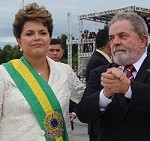Brazil has been acknowledged as a future power, given its strengths and abundant resources. However, critics joke that it has remained, and will continue to be, only a “future” power because expectations about the country during economic booms have dwindled during cyclical busts and military dictatorships.
Brazil’s global profile did reach unprecedented heights during the presidency of Luiz Inacio Lula da Silva, whose proactive policies spotlighted Brazil. During Lula’s term (2003-2011) the economic growth rate was high – from 2.7% in 2002 to as high as 7.5% in 2010. Poverty and income inequality were reduced – from 36% in 2003 to 21.8% in 2009 – through successful inclusive development policies.
In 2007, the country discovered enormous pre-salt oil reserves and Brazil has since moved from importing oil to becoming an exporter of oil. Before that, it was already a global pioneer in the use of sugarcane ethanol as fuel.
In 2008, Brazil initiated the formation of regional groups such as the Union of South American Nations (UNASUR) and the Community of Latin American and Caribbean States (CELAC), as a part of its regional leadership role. It also joined India, Germany and Japan in the campaign for permanent membership of the UN Security Council.
But the Brazilian economy has slowed down after 2010. Inflation rose from below 4% in 2007 to above 6% in 2011 and 2013. Interest rates, which were very high before Lula’s term (25%) and were brought down to below 8% in 2012, went back up to 10% in 2013.
One reason for this slowing down is the fall in China’s demand for Brazilian minerals and oil, and a fall in the prices of these commodities exported to China. The production of and investment in oil and ethanol have stagnated because of the competition from subsidised gasoline; many ethanol plants have shut down. Corruption scandals have hit the ruling party; Standard & Poor’s downgraded the investment grade rating of the country to the lowest rung in March 2014.
The massive ongoing protests against corruption in politics and the bad quality of public heath and education, which started in June 2013, have shaken the political establishment and challenged the authorities.
President Dilma Rousseff appears to be disinterested in foreign policy and in rebuilding a global profile for Brazil. It is in this context that questions are once again being asked about Brazil’s place in the world.
However, Brazil retains some intrinsic and acquired strengths vis-à-vis the P5 in the UNSC and other emerging powers. Unlike the other major powers of the world, Brazil does not have historical baggage. The victors of the Second World War in the P5 and those who lost the war – Germany and Japan – have the burden of historical memory, which influences their foreign policy and global view.
But Brazilians are in the enviable position of not being able to identify “enemies” in their Strategic Defence Policy, which is based on perceived “vulnerabilities.” Brazil has had no wars in the last 150 years.
Despite having a border with 10 South American countries, Brazil does not have any territorial issues with its neighbours. It does not face a hostile or unstable neighbourhood, which countries like India are burdened with.
Brazil has avoided a potential arms race and nuclear rivalry with Argentina by embracing the country in Mercosur. The country does not face any terrorism threat.
Almost all Brazilians speak one language – Portuguese – and follow one religion – Christianity – and the country does not face any internal threat from fundamentalism or from ethnic, linguistic, and religious conflicts.
Brazil is not only self-reliant in food and energy security, it also has a surplus of oil, gas, soybean, pulses, and other agricultural produce to export. In contrast, other emerging powers such as China and India find their foreign policy constrained by their need to import energy and food.
Brazil has set an example for other developing countries through inclusive development programmes such as Bolsa Familia. The “Brasilia Consensus” – a pragmatic and balanced mix of pro-poor and pro-business policies – is a role model for other developing countries.
In the global rankings, Brazil is the fifth biggest country in area and population and the seventh largest economy, according to World Bank data. It enjoys a moderate climate and is not vulnerable to extreme natural calamities.
With these distinct and multiple advantages, it is only a matter of time before Brazil gets its due status as a global power. At the same time, Brazil does have to tackle many challenges such as poverty, inequality, drug trafficking, infrastructure gaps, healthcare and education. But these problems can be solved in the medium-term, unlike some of the serious long-term problems faced by India.
Brazilians are not in a hurry to push for UNSC membership at the moment. In a multipolar world, they are likely to use a multilateral approach to continue to work through all available channels and forums to gradually build on their strengths. This makes Brazil an ideal global partner for India, which has a similar worldview and aspirations.
Ambassador Viswanathan is Distinguished Fellow, Latin America Studies, Gateway House. He is the former Indian Ambassador to Argentina, Uruguay, Paraguay and Venezuela, and Consul General in Sao Paulo.
This article was exclusively written for Gateway House: Indian Council on Global Relations. You can read more exclusive content here.
For interview requests with the author, or for permission to republish, please contact outreach@gatewayhouse.in.
© Copyright 2014 Gateway House: Indian Council on Global Relations. All rights reserved. Any unauthorized copying or reproduction is strictly prohibited.


